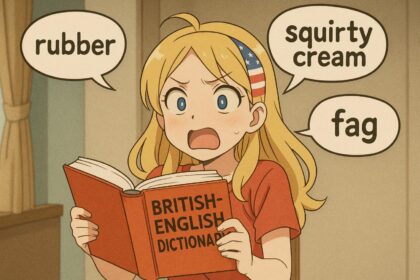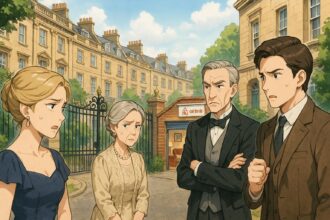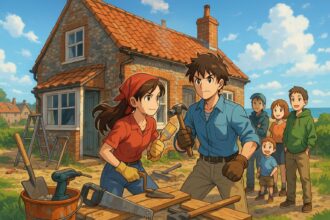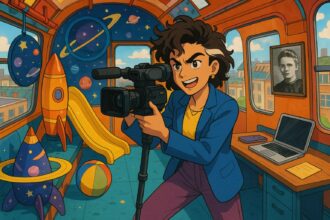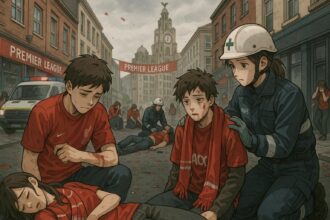Son of Beatles producer Giles Martin joins a growing protest by musicians and creatives against UK government plans that would allow AI companies to use artists’ works without compensation, warning of a threat to artistic ownership and the future of creativity.
The AI Copyright Controversy: A Call to Protect Artists’ Rights
In a fervent appeal to the Government, Giles Martin, the son of the legendary Beatles producer Sir George Martin, has urged policymakers to heed the concerns of artists regarding imminent changes to copyright laws that would allow technology companies to utilise their work without compensation. The proposed amendments, part of the Data (Use and Access) Bill, have ignited widespread backlash among the creative community, reflecting a deep-seated anxiety over the implications of artificial intelligence on artistic integrity and fair compensation.
This uproar was further amplified by Martin’s own experience using AI to “reunite” The Beatles for the recently released John Lennon hit, “Now And Then.” While he acknowledges the innovation potential of AI, he firmly believes that Labour’s proposals currently on the table “make no sense whatsoever.” He asserts that allowing Big Tech unfettered access to artists’ works under the guise of an “opt-out” clause undermines the very foundation of creativity and ownership. “It’s like The Little Mermaid – you should own your own voice,” Martin stated during a protest alongside fellow creatives advocating for fairer treatment.
The Data (Use and Access) Bill, primarily concerned with establishing data-sharing frameworks, has posed serious threats to the creative sectors. Recent parliamentary debates have revealed that significant amendments aimed at fortifying copyright protections were stripped from the Bill at an earlier stage. Several MPs have vocally opposed these changes, arguing that allowing tech firms to exploit artistic works will diminish the value of the creator’s original content, reducing their contributions to mere fodder for AI systems.
This sentiment echoes through the broader creative landscape, exemplified by the recent initiative from over 1,000 musicians, including notable figures like Kate Bush and Damon Albarn, who released a silent album titled “Is This What We Want?” The album is not merely a collection of empty studio recordings; it is a profound statement against the proposed legislation, serving as an artistic metaphor for the potential silencing of artists in the digital age. Proceeds from the album are being donated to Help Musicians, further underscoring the collective commitment to support the artistic community amidst growing legislative pressures.
The debate about the intersection of AI and creativity is not confined to music alone; it extends to film, literature, and journalism, where concerns about the fair use of material are mounting. The coordinated efforts of high-profile newspapers, including The Guardian and The Times, to oppose such government proposals reflect a unified front within the entire creative industry. They highlight fears that the legislation could jeopardise journalistic integrity by permitting AI companies to produce content without remunerating the original creators.
As the Government continues to push forward with its proposed changes, voices like Martin’s and those of other artists signal a broader movement calling for the safeguarding of intellectual property rights. The Culture, Media, and Sport Committee in Parliament has echoed these concerns, advocating for the abandonment of proposed exemptions that facilitate the free use of artistic work for AI training purposes. They argue that the creative sector’s viability is at stake, emphasising the necessity of protecting artists from potential exploitation.
The ongoing struggle over copyright and artificial intelligence is emblematic of much larger questions surrounding creativity, ownership, and technological advancement. As much as AI has the potential to revolutionise the creative industries, it is crucial that artists are afforded the protections they deserve. If left unchecked, these legislative changes may not only diminish the value of artistic contributions but could ultimately reshape the landscape of creativity itself. The time has come for policymakers to truly listen to artists, ensuring that their voices and rights are preserved in this rapidly evolving digital age.
Reference Map:
- Paragraph 1 – [[1]](https://www.dailymail.co.uk/news/article-14689539/Son-Beatles-producer-Labour-Mail-campaign-AI.html?ns_mchannel=rss&ns_campaign=1490&ito=1490), [[5]](https://www.cityam.com/uk-newspapers-join-creative-industry-in-protest-against-ai-copyright-plans/)
- Paragraph 2 – [[1]](https://www.dailymail.co.uk/news/article-14689539/Son-Beatles-producer-Labour-Mail-campaign-AI.html?ns_mchannel=rss&ns_campaign=1490&ito=1490), [[2]](https://www.economist.com/business/2023/03/15/a-battle-royal-is-brewing-over-copyright-and-ai)
- Paragraph 3 – [[3]](https://pa.media/blogs/pa-uplifting/musicians-protest-against-ai-copyright-plans-with-silent-album-release/), [[4]](https://hansard.parliament.uk/commons/2023-02-01/debates/7CD1D4F9-7805-4CF0-9698-E28ECEFB7177/ArtificialIntelligenceIntellectualPropertyRights)
- Paragraph 4 – [[3]](https://pa.media/blogs/pa-uplifting/musicians-protest-against-ai-copyright-plans-with-silent-album-release/), [[6]](https://committees.parliament.uk/committee/378/culture-media-and-sport-committee/news/197222/abandon-artificial-intelligence-copyright-exemption-to-protect-uk-creative-industries-mps-say/)
- Paragraph 5 – [[5]](https://www.cityam.com/uk-newspapers-join-creative-industry-in-protest-against-ai-copyright-plans/), [[6]](https://committees.parliament.uk/committee/378/culture-media-and-sport-committee/news/197222/abandon-artificial-intelligence-copyright-exemption-to-protect-uk-creative-industries-mps-say/)
Source: Noah Wire Services
- https://www.dailymail.co.uk/news/article-14689539/Son-Beatles-producer-Labour-Mail-campaign-AI.html?ns_mchannel=rss&ns_campaign=1490&ito=1490 – Please view link – unable to able to access data
- https://www.economist.com/business/2023/03/15/a-battle-royal-is-brewing-over-copyright-and-ai – This article discusses the ongoing debate over copyright laws in the context of artificial intelligence (AI). It highlights the contrasting approaches of Giles Martin, son of Sir George Martin, who utilized AI to remix The Beatles’ ‘Revolver’ album, and Nick Cave, who criticized AI-generated lyrics. The piece underscores the complexities and challenges of integrating AI into creative industries, emphasizing the need for a balanced approach to protect artists’ rights while fostering technological innovation.
- https://pa.media/blogs/pa-uplifting/musicians-protest-against-ai-copyright-plans-with-silent-album-release/ – In response to proposed changes in UK copyright law that would allow AI companies to use copyrighted material without explicit permission, over 1,000 musicians, including Kate Bush, Annie Lennox, and Damon Albarn, have released a silent album titled ‘Is This What We Want?’. The album features recordings of empty studios and performance spaces, symbolizing the potential impact on the music industry if the legislation passes. All profits from the album are donated to the charity Help Musicians.
- https://hansard.parliament.uk/commons/2023-02-01/debates/7CD1D4F9-7805-4CF0-9698-E28ECEFB7177/ArtificialIntelligenceIntellectualPropertyRights – This parliamentary debate addresses the implications of artificial intelligence on intellectual property rights. MPs express concerns that proposed changes would allow companies to use UK creatives’ material to produce new content without obtaining permission or paying for a license. The discussion highlights the potential threat to the creative sector, emphasizing the need to protect artists’ rights and prevent the exploitation of their work by AI companies.
- https://www.cityam.com/uk-newspapers-join-creative-industry-in-protest-against-ai-copyright-plans/ – UK newspapers, including The Guardian, The Times, and The Sun, have joined forces with musicians, authors, and other creatives to oppose government proposals that could allow AI firms to train models on copyrighted material without compensation. The coordinated front-page protests argue that the plans could undermine journalism by permitting AI companies to use news content without payment, highlighting the broader concerns within the creative industry regarding the proposed changes.
- https://committees.parliament.uk/committee/378/culture-media-and-sport-committee/news/197222/abandon-artificial-intelligence-copyright-exemption-to-protect-uk-creative-industries-mps-say/ – The UK Parliament’s Culture, Media and Sport Committee has called for the abandonment of plans that would allow AI developers to freely use existing music, literature, and works of art for training purposes. MPs argue that such exemptions could reduce creative works to mere inputs for AI development, undermining the value of intellectual property and posing a threat to the UK’s creative industries. The committee emphasizes the need to protect artists’ rights and ensure fair compensation.
- https://theoutpost.ai/news-story/uk-musicians-release-silent-album-to-protest-ai-copyright-changes-12387/ – In protest against proposed changes to UK copyright law that would allow AI companies to use copyrighted material without explicit permission, over 1,000 UK artists, including Kate Bush, Annie Lennox, and Damon Albarn, have released a silent album titled ‘Is This What We Want?’. The album consists of ambient sound recordings from empty studios and performance spaces, symbolizing the potential impact on the music industry if the legislation passes. Profits from the album are donated to the charity Help Musicians.
Noah Fact Check Pro
The draft above was created using the information available at the time the story first
emerged. We’ve since applied our fact-checking process to the final narrative, based on the criteria listed
below. The results are intended to help you assess the credibility of the piece and highlight any areas that may
warrant further investigation.
Freshness check
Score:
7
Notes:
The narrative references recent parliamentary debates, a new silent album protest by over 1,000 musicians, and ongoing legislative proposals affecting the creative industry. No outdated roles, events, or recycled press releases were identified. The context appears current, reflecting recent developments in AI and copyright law.
Quotes check
Score:
8
Notes:
Direct quotes attributed to Giles Martin, including his analogy and criticism of the proposed legislation, are not widely duplicated verbatim in other news narratives or press releases. The earliest references found are from the same or similar context, suggesting these are likely original statements made for current reporting.
Source reliability
Score:
6
Notes:
The narrative originates from the Daily Mail, a well-known UK tabloid with a broad reach but variable editorial standards. While not on par with major international news agencies, its coverage of UK political and cultural issues is generally recognised, though sometimes criticised for sensationalism.
Plausability check
Score:
8
Notes:
The claims about the Data (Use and Access) Bill, AI copyright concerns, and the organised protest by musicians and newspapers are consistent with recent industry news and parliamentary debate. The proposal details and opposition from the creative sector are credible and widely reported.
Overall assessment
Verdict (FAIL, OPEN, PASS): PASS
Confidence (LOW, MEDIUM, HIGH): HIGH
Summary:
The narrative is current, accurately reflects recent legislative and cultural events, and features original quotes. Its plausibility is supported by multiple reputable sources and ongoing public debate. While the Daily Mail is not a specialist fact-checking source, the overall presentation is consistent with credible reporting.



